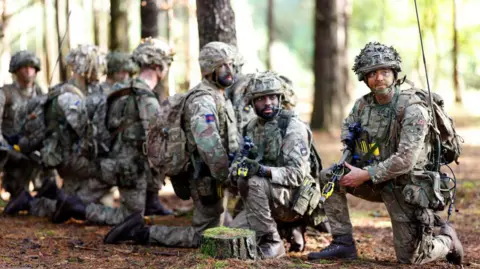Major war could destroy army in six months - minister
 Getty Images
Getty ImagesThe regular British army could be wiped out in as little as six months if forced to fight a war on the scale of the Ukraine conflict, a defence minister has warned.
Alistair Carns said a rate of casualties similar to that prompted by Russia's invasion of Ukraine would lead to the army being "expended" within six to 12 months.
He said it illustrated the importance of having reserves in order to be able to fight in a "war of scale".
Official figures show the army had 109,245 personnel on 1 October, including 25,814 volunteer reservists.
Carns, a former Royal Marines colonel who is also a reservist, said Russia was suffering losses of around 1,500 soldiers, killed or wounded, a day.
"In a war of scale - not a limited intervention, but one similar to Ukraine - our army for example on the current casualty rates would be expended, as part of a broader multinational coalition, in six months to a year," he added.
In a speech on reserves at the Royal United Services Institute defence think tank in London, Carns, the minister for veterans and people, said: "That doesn't mean to say we need a bigger army, but it does mean we must be able to generate depth and mass rapidly in the event of a crisis.
"The reserves are critical, absolutely central, to that process.
"Without them we cannot generate mass, we cannot meet the plethora of defence tasks and challenges that we require, and we cannot seamlessly integrate the very best experts into the heart of our armed forces.”
'Third nuclear age'
Speaking separately at the same think tank, the head of the armed forces said it was important to note there was only a "remote" chance that Russia would launch a "significant direct attack or invasion" on the UK, or other Nato member.
Admiral Sir Tony Radakin added that Russia "knows the response would be overwhelming, whether conventional or nuclear".
But he added that it showed the need for nuclear deterrence to be "kept strong and strengthened," warning that the world was entering a "third nuclear age" following the Cold War and subsequent period of disarmament.
This new age would be defined by the "almost total absence of the security architectures that went before," and more countries having nuclear weapons.
He added that China's increasing nuclear weapons stockpile meant the United States could face a "two-peer challenge" from Beijing and Moscow, with both countries possessing significant arsenals.
Army reservists serve in their spare time, getting paid to train outside their main jobs.
Carns said the reality of wars such as the one being fought in Ukraine was that they were "attritional in nature".
He also said the UK needed to "catch up with Nato allies" by placing a greater emphasis on its reserves.
A Ministry of Defence spokesperson said the UK's armed forces were "amongst the best in the world and offer a 24/7 defence of the UK, operating alongside our allies and partners to prepare for any event".
“The Strategic Defence Review will look at the threats we face and the capabilities we need so that our Armed Forces are better ready to fight, more integrated and more innovative," they added.
“Our Reserves are an essential and extremely valued element of the Armed Forces and the contributions they make to our resilience and our ability to call on additional personnel when required are vital.”
Earlier, the prime minister's official spokesman said the Budget had "invested billions of pounds into defence".
'Time to act'
Last month, Deputy Chief of the Defence Staff Lieutenant General Sir Rob Magowan told MPs on the Defence Select Committee: “If the British Army was asked to fight tonight, it would fight tonight.
“I don’t think anybody in this room should be under any illusion that if the Russians invaded eastern Europe tonight, then we would meet them in that fight.”
Earlier on Wednesday, Foreign Secretary David Lammy urged Nato's European members to step up their defence spending ahead of Donald Trump's return to the White House.
The US president-elect has accused European countries of relying on American taxpayers for their security.
At a meeting of Nato's foreign ministers in Brussels, Lammy said "the time to act is now" - although the UK government has yet to set out its own plans for increasing its spending on defence to 2.5% of national output.
He highlighted Russia's invasion of Ukraine and its involvement in conflicts around the world, including the Middle East.
"In the United Kingdom, we are at 2.3%, heading to 2.5% as soon as we can get there, and we urge all allies across the Nato family to get serious about defence spending.
"All of our populations require us to understand the tremendous security challenges that we are facing at this time," he added.
